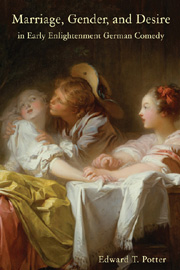Book contents
- Frontmatter
- Contents
- Acknowledgements
- List of Abbreviations
- Introduction: Comedy, the Sentimental Marriage, and Modes of Resistance
- 1 Promoting the Sentimental Marriage in Theory and in Practice
- 2 The Virgin Huntress Tamed: J. C. Gottsched's Atalanta and the Erasure of Female Autonomy
- 3 Marriage Brokering at the Expense of Economics: C. F. Gellert's Die zärtlichen Schwestern
- 4 The Clothes Make the Man: J. E. Schlegel's Der Triumph der guten Frauen
- 5 Cross-Dressing and Gender Performance in G. E. Lessing's Der Misogyne
- 6 Sickness Masks Desire in Th. J. Quistorp's Der Hypochondrist
- Conclusion
- Works Cited
- Index
1 - Promoting the Sentimental Marriage in Theory and in Practice
Published online by Cambridge University Press: 05 February 2013
- Frontmatter
- Contents
- Acknowledgements
- List of Abbreviations
- Introduction: Comedy, the Sentimental Marriage, and Modes of Resistance
- 1 Promoting the Sentimental Marriage in Theory and in Practice
- 2 The Virgin Huntress Tamed: J. C. Gottsched's Atalanta and the Erasure of Female Autonomy
- 3 Marriage Brokering at the Expense of Economics: C. F. Gellert's Die zärtlichen Schwestern
- 4 The Clothes Make the Man: J. E. Schlegel's Der Triumph der guten Frauen
- 5 Cross-Dressing and Gender Performance in G. E. Lessing's Der Misogyne
- 6 Sickness Masks Desire in Th. J. Quistorp's Der Hypochondrist
- Conclusion
- Works Cited
- Index
Summary
The great reformer of eighteenth-century German theater Johann Christoph Gottsched claimed for comedy the ability to transform morality by means of ridiculing moral failings. As the dominant German literary figure of the first half of the eighteenth century, Gottsched had an immense influence on the dramatists of the period. He set out to make the German theater into a vehicle for the moral improvement of the audience. At the beginning of the eighteenth century, German theater represented a variegated landscape. Court theater was dominated by French and Italian acting troupes performing plays and operas in their own languages. The baroque tradition of German-language dramas performed by schoolchildren lived on in amateur theater productions. In the larger towns, audiences could periodically enjoy performances by wandering troupes of actors who staged Haupt- und Staatsaktionen, which were popular, extemporized versions of German baroque plays or of plays by Shakespeare, interspersed with comedic interludes featuring the bawdy, gluttonous character Harlekin, often known as Hanswurst in Germany. Gottsched sought to replace these conflations of comic and tragic elements with a more refined drama based on the French neoclassical theater.
Gottsched availed himself of several practical means in order to reform the German theater. In 1727, he allied himself with Friederike Caroline Neuber and her troupe of actors in order to stage performances of the type of plays he was promoting. He described in detail his recipe for producing literary works in his modern German poetics, Versuch einer Critischen Dichtkunst vor die Deutschen (An attempt at a critical poetics for the Germans, 1730; 4th ed., 1751).
- Type
- Chapter
- Information
- Publisher: Boydell & BrewerPrint publication year: 2012



